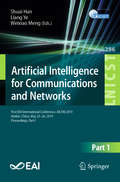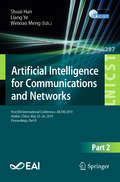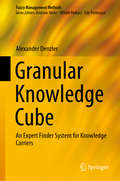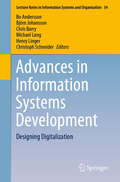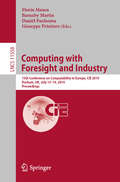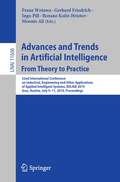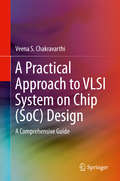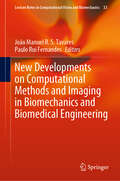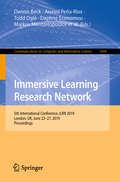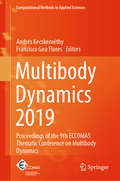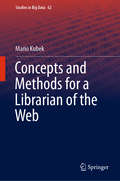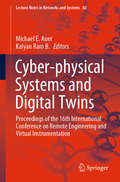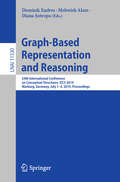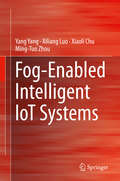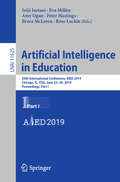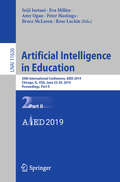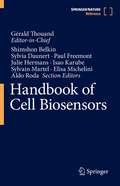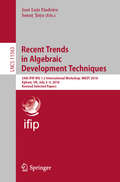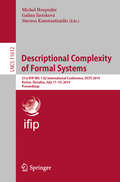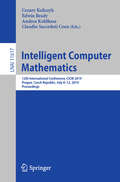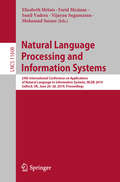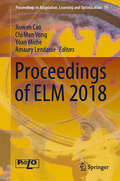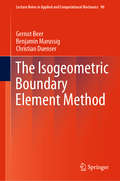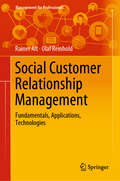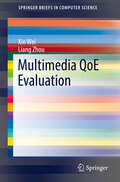- Table View
- List View
Artificial Intelligence for Communications and Networks: First EAI International Conference, AICON 2019, Harbin, China, May 25–26, 2019, Proceedings, Part I (Lecture Notes of the Institute for Computer Sciences, Social Informatics and Telecommunications Engineering #286)
by Shuai Han Liang Ye Weixiao MengThis two-volume set LNICST 286-287 constitutes the post-conference proceedings of the First EAI International Conference on Artificial Intelligence for Communications and Networks, AICON 2019, held in Harbin, China, in May 2019. The 93 full papers were carefully reviewed and selected from 152 submissions. The papers are organized in topical sections on artificial intelligence, mobile network, deep learning, machine learning, wireless communication, cognitive radio, internet of things, big data, communication system, pattern recognition, channel model, beamforming, signal processing, 5G, mobile management, resource management, wireless position.
Artificial Intelligence for Communications and Networks: First EAI International Conference, AICON 2019, Harbin, China, May 25–26, 2019, Proceedings, Part II (Lecture Notes of the Institute for Computer Sciences, Social Informatics and Telecommunications Engineering #287)
by Shuai Han Liang Ye Weixiao MengThis two-volume set LNICST 286-287 constitutes the post-conference proceedings of the First EAI International Conference on Artificial Intelligence for Communications and Networks, AICON 2019, held in Harbin, China, in May 2019. The 93 full papers were carefully reviewed and selected from 152 submissions. The papers are organized in topical sections on artificial intelligence, mobile network, deep learning, machine learning, wireless communication, cognitive radio, internet of things, big data, communication system, pattern recognition, channel model, beamforming, signal processing, 5G, mobile management, resource management, wireless position.
Granular Knowledge Cube: An Expert Finder System for Knowledge Carriers (Fuzzy Management Methods)
by Alexander DenzlerThis book introduces a novel type of expert finder system that can determine the knowledge that specific users within a community hold, using explicit and implicit data sources to do so. Further, it details how this is accomplished by combining granular computing, natural language processing and a set of metrics that it introduces to measure and compare candidates’ suitability. The book describes profiling techniques that can be used to assess knowledge requirements on the basis of a given problem statement or question, so as to ensure that only the most suitable candidates are recommended. The book brings together findings from natural language processing, artificial intelligence and big data, which it subsequently applies to the context of expert finder systems. Accordingly, it will appeal to researchers, developers and innovators alike.
Advances in Information Systems Development: Designing Digitalization (Lecture Notes in Information Systems and Organisation #34)
by Bo Andersson Björn Johansson Chris Barry Michael Lang Henry Linger Christoph SchneiderThis volume features a collection of papers on emerging concepts, significant insights, novel approaches and ideas in information systems research. It examines advances in information systems development in general, and their impact on the development of new methods, tools and management. The book contains invited papers selected from the 27th International Conference on Information Systems Development (ISD) held in Lund, Sweden, August 22 - 24, 2018. The revised and expanded papers present research that focuses on methods, tools and management in information systems development. These issues are significant as they provide the basis for organizations to identify new markets, support innovative technology deployment, and enable mobile applications to detect, sense, interpret and respond to the environment.
Computing with Foresight and Industry: 15th Conference on Computability in Europe, CiE 2019, Durham, UK, July 15–19, 2019, Proceedings (Lecture Notes in Computer Science #11558)
by Florin Manea Barnaby Martin Daniël Paulusma Giuseppe PrimieroThis book constitutes the refereed proceedings of the 15th Conference on Computability in Europe, CiE 2019, held in Durham, UK, in July 2019.The 20 revised full papers presented were carefully reviewed and selected from 35 submissions. In addition, this volume includes 7 invited papers. The conference CiE 2018 had the following six special sessions: computational neuroscience, history and philosophy of computing, lowness notions in computability, probabilistic programming and higher-order computation, smoothed and probabilistic analysis of algorithms, and transnite computations.
Advances and Trends in Artificial Intelligence. From Theory to Practice: 32nd International Conference on Industrial, Engineering and Other Applications of Applied Intelligent Systems, IEA/AIE 2019, Graz, Austria, July 9–11, 2019, Proceedings (Lecture Notes in Computer Science #11606)
by Gerhard Friedrich Moonis Ali Franz Wotawa Roxane Koitz-Hristov Ingo PillThis book constitutes the thoroughly refereed proceedings of the 32nd International Conference on Industrial, Engineering and Other Applications of Applied Intelligent Systems, IEA/AIE 2019, held in Graz, Austria, in July 2019. The 41 full papers and 32 short papers presented were carefully reviewed and selected from 151 submissions. The IEA/AIE 2019 conference will continue the tradition of emphasizing on applications of applied intelligent systems to solve real-life problems in all areas. These areas include engineering, science, industry, automation and robotics, business and finance, medicine and biomedicine, bioinformatics, cyberspace, and human-machine interactions. IEA/AIE 2019 will have a special focus on automated driving and autonomous systems and also contributions dealing with such systems or their verification and validation as well.
A Practical Approach to VLSI System on Chip (SoC) Design: A Comprehensive Guide
by Veena S. ChakravarthiThis book provides a comprehensive overview of the VLSI design process. It covers end-to-end system on chip (SoC) design, including design methodology, the design environment, tools, choice of design components, handoff procedures, and design infrastructure needs. The book also offers critical guidance on the latest UPF-based low power design flow issues for deep submicron SOC designs, which will prepare readers for the challenges of working at the nanotechnology scale. This practical guide will provide engineers who aspire to be VLSI designers with the techniques and tools of the trade, and will also be a valuable professional reference for those already working in VLSI design and verification with a focus on complex SoC designs.A comprehensive practical guide for VLSI designers;Covers end-to-end VLSI SoC design flow;Includes source code, case studies, and application examples.
New Developments on Computational Methods and Imaging in Biomechanics and Biomedical Engineering (Lecture Notes in Computational Vision and Biomechanics #999)
by Paulo Rui Fernandes João Manuel R. S. TavaresThis book gathers selected, extended and revised contributions to the 15th International Symposium on Computer Methods in Biomechanics and Biomedical Engineering (CMBBE2018), and the 3rd Conference on Imaging and Visualization, which took place on 26-29 March, 2018, in Lisbon, Portugal. The respective chapters highlight cutting-edge methods, e.g. new algorithms, image analysis techniques, and multibody modeling methods; and new findings obtained by applying them in biological and/or medical contexts. Original numerical studies, Monte Carlo simulations, FEM analyses and reaction-diffusion models are described in detail, together with intriguing new applications. The book offers a timely source of information for biologists, engineers, applied mathematicians and clinical researchers working on multidisciplinary projects, and is also intended to foster closer collaboration between these groups.
Immersive Learning Research Network: 5th International Conference, iLRN 2019, London, UK, June 23–27, 2019, Proceedings (Communications in Computer and Information Science #1044)
by Leonel Morgado Johanna Pirker Dennis Beck Jonathon Richter Christian Gütl Anasol Peña-Rios Todd Ogle Daphne Economou Markos Mentzelopoulos Christian Eckhardt Roxane Koitz-Hristov Michael GardnerThis volume constitutes the refereed proceedings of the 5th International Conference of the Immersive Learning Network, iLRN 2019, held in London, UK, in June 2019.The 18 revised full papers and presented in this volume were carefully reviewed and selected from 60 submissions. The papers are organized in topical sections on science, technology, engineering, and mathematics (STEM); disciplinary applications: special education; disciplinary applications: history; pedagogical strategies; immersion and presence.
Multibody Dynamics 2019: Proceedings of the 9th ECCOMAS Thematic Conference on Multibody Dynamics (Computational Methods in Applied Sciences #53)
by Andrés Kecskeméthy Francisco Geu FloresIn this work, outstanding, recent developments in various disciplines, such as structural dynamics, multiphysic mechanics, computational mathematics, control theory, biomechanics, and computer science, are merged together in order to provide academicians and professionals with methods and tools for the virtual prototyping of complex mechanical systems. Each chapter of the work represents an important contribution to multibody dynamics, a discipline that plays a central role in the modelling, analysis, simulation and optimization of mechanical systems in a variety of fields and for a wide range of applications.
Concepts and Methods for a Librarian of the Web (Studies in Big Data #62)
by Mario KubekThe World Wide Web can be considered a huge library that in consequence needs a capable librarian responsible for the classification and retrieval of documents as well as the mediation between library resources and users. Based on this idea, the concept of the “Librarian of the Web” is introduced which comprises novel, librarian-inspired methods and technical solutions to decentrally search for text documents in the web using peer-to-peer technology.The concept’s implementation in the form of an interactive peer-to-peer client, called “WebEngine”, is elaborated on in detail. This software extends and interconnects common web servers creating a fully integrated, decentralised and self-organising web search system on top of the existing web structure. Thus, the web is turned into its own powerful search engine without the need for any central authority.This book is intended for researchers and practitioners having a solid background in the fields of Information Retrieval and Web Mining.
Cyber-physical Systems and Digital Twins: Proceedings of the 16th International Conference on Remote Engineering and Virtual Instrumentation (Lecture Notes in Networks and Systems #80)
by Michael Auer Kalyan B.This book constitutes the proceedings of the 16th International Conference on Remote Engineering and Virtual Instrumentation (REV), held at the BMS College of Engineering, Bangalore, India on 3–6 February 2019. Today, online technologies are at the core of most fields of engineering, as well as of society as a whole, and are inseparably connected with Internet of Things,cyber-physical systems,collaborative networks and grids,cyber cloud technologies,service architectures, to name but a few. Since it was first held in, 2004, the REV conference has focused on the increasing use of the Internet for engineering tasks and the problems surrounding it. The 2019 conference demonstrated and discussed the fundamentals, applications and experiences in the field of online engineering and virtual instrumentation. It also presented guidelines for university-level courses on these topics, in view of the increasing globalization of education and the demand for teleworking, remote services and collaborative working environments.
Graph-Based Representation and Reasoning: 24th International Conference on Conceptual Structures, ICCS 2019, Marburg, Germany, July 1–4, 2019, Proceedings (Lecture Notes in Computer Science #11530)
by Dominik Endres Mehwish Alam Diana ŞotropaThis book constitutes the proceedings of the 24th International Conference on Conceptual Structures, ICCS 2019, held in Marburg, Germany, in July 2019. The 14 full papers and 6 short papers presented were carefully reviewed and selected from 29 submissions. The proceedings also include one of the two invited talks. The papers focus on the representation of and reasoning with conceptual structures in a variety of contexts. ICCS 2019's theme was entitled "Graphs in Human and Machine Cognition."
Fog-Enabled Intelligent IoT Systems
by Yang Yang Xiliang Luo Xiaoli Chu Ming-Tuo ZhouThis book first provides a comprehensive review of state-of-the-art IoT technologies and applications in different industrial sectors and public services. The authors give in-depth analyses of fog computing architecture and key technologies that fulfill the challenging requirements of enabling computing services anywhere along the cloud-to-thing continuum. Further, in order to make IoT systems more intelligent and more efficient, a fog-enabled service architecture is proposed to address the latency requirements, bandwidth limitations, and computing power issues in realistic cross-domain application scenarios with limited priori domain knowledge, i.e. physical laws, system statuses, operation principles and execution rules. Based on this fog-enabled architecture, a series of data-driven self-learning applications in different industrial sectors and public services are investigated and discussed, such as robot SLAM and formation control, wireless network self-optimization, intelligent transportation system, smart home and user behavior recognition. Finally, the advantages and future directions of fog-enabled intelligent IoT systems are summarized. Provides a comprehensive review of state-of-the-art IoT technologies and applications in different industrial sectors and public servicesPresents a fog-enabled service architecture with detailed technical approaches for realistic cross-domain application scenarios with limited prior domain knowledgeOutlines a series of data-driven self-learning applications (with new algorithms) in different industrial sectors and public services
Artificial Intelligence in Education: 20th International Conference, AIED 2019, Chicago, IL, USA, June 25-29, 2019, Proceedings, Part I (Lecture Notes in Computer Science #11625)
by Seiji Isotani Eva Millán Amy Ogan Peter Hastings Bruce McLaren Rose LuckinThis two-volume set LNCS 11625 and 11626 constitutes the refereed proceedings of the 20th International Conference on Artificial Intelligence in Education, AIED 2019, held in Chicago, IL, USA, in June 2019. The 45 full papers presented together with 41 short, 10 doctoral consortium, 6 industry, and 10 workshop papers were carefully reviewed and selected from 177 submissions. AIED 2019 solicits empirical and theoretical papers particularly in the following lines of research and application: Intelligent and interactive technologies in an educational context; Modelling and representation; Models of teaching and learning; Learning contexts and informal learning; Evaluation; Innovative applications; Intelligent techniques to support disadvantaged schools and students, inequity and inequality in education.
Artificial Intelligence in Education: 20th International Conference, AIED 2019, Chicago, IL, USA, June 25-29, 2019, Proceedings, Part II (Lecture Notes in Computer Science #11626)
by Seiji Isotani Eva Millán Amy Ogan Peter Hastings Bruce McLaren Rose LuckinThis two-volume set LNCS 11625 and 11626 constitutes the refereed proceedings of the 20th International Conference on Artificial Intelligence in Education, AIED 2019, held in Chicago, IL, USA, in June 2019. The 45 full papers presented together with 41 short, 10 doctoral consortium, 6 industry, and 10 workshop papers were carefully reviewed and selected from 177 submissions. AIED 2019 solicits empirical and theoretical papers particularly in the following lines of research and application: Intelligent and interactive technologies in an educational context; Modelling and representation; Models of teaching and learning; Learning contexts and informal learning; Evaluation; Innovative applications; Intelligent techniques to support disadvantaged schools and students, inequity and inequality in education.
Handbook of Cell Biosensors
by Shimshon Belkin Sylvia Daunert Paul Freemont Julie Hermans Isao Karube Sylvain Martel Elisa Michelini Aldo RodaThis handbook is an interdisciplinary and comprehensive reference covering all aspects of cell biosensors. It is divided into four main sections which are led and organized by numerous international experts. The scope of coverage includes: Fundamentals and genetics for biosensor applicationsTransducers, Materials and SystemsMarkets, innovation and educationApplication of biosensors in business Biosensor research is an exciting hybrid world where biologists, chemists, physicists, engineers and computer engineers come together. This handbook will serve as an invaluable living resource for all researchers in academia and industry working with cell biosensors.
Recent Trends in Algebraic Development Techniques: 24th IFIP WG 1.3 International Workshop, WADT 2018, Egham, UK, July 2–5, 2018, Revised Selected Papers (Lecture Notes in Computer Science #11563)
by José Luiz Fiadeiro Ionuț ȚuțuThis book constitutes the thoroughly refereed post-conference proceedings of the 24th IFIP WG 1.3 International Workshop on Algebraic Development Techniques, WADT 2018, held in Egham, UK in July 2018. The 9 revised papers presented were carefully reviewed and selected from 13 submissions. The contributed presentations covered a range of topics: specification and modelling languages such as CASL, Event-B, Maude, MMT, and SRML; foundations of system specification such as graph transformation, categorical semantics, fuzzy and temporal logics, institutions, module systems and parameterization, refinement, static analysis, and substitutions; and applications including categorical programming, communicating finite state machines, neuralsymbolicintegration, relational databases, and service-oriented computing.
Descriptional Complexity of Formal Systems: 21st IFIP WG 1.02 International Conference, DCFS 2019, Košice, Slovakia, July 17–19, 2019, Proceedings (Lecture Notes in Computer Science #11612)
by Michal Hospodár Galina Jirásková Stavros KonstantinidisThis book constitutes the proceedings of the 21st International Conference on Descriptional Complexity of Format Systems, DCFS 2019, held in Košice, Slovakia, in July 2019. The 18 full papers presented in this volume were carefully reviewed and selected from 25 submissions. The book also contains 4 invited talks. They deal with all aspects of descriptional complexity and costs of description of objects in various computational models, such as Turing machines, pushdown automata, finite automata, grammars, and others.
Intelligent Computer Mathematics: 12th International Conference, CICM 2019, Prague, Czech Republic, July 8–12, 2019, Proceedings (Lecture Notes in Computer Science #11617)
by Cezary Kaliszyk Edwin Brady Andrea Kohlhase Claudio Sacerdoti CoenThis book constitutes the refereed proceedings of the 12th International Conference on Intelligent Computer Mathematics, CICM 2019, held in Prague, Czech Republic, in July 2019. The 19 full papers presented were carefully reviewed and selected from a total of 41 submissions. The papers focus on digital and computational solutions which are becoming the prevalent means for the generation, communication, processing, storage and curation of mathematical information. Separate communities have developed to investigate and build computer based systems for computer algebra, automated deduction, and mathematical publishing as well as novel user interfaces. While all of these systems excel in their own right, their integration can lead to synergies offering significant added value.
Natural Language Processing and Information Systems: 24th International Conference on Applications of Natural Language to Information Systems, NLDB 2019, Salford, UK, June 26–28, 2019, Proceedings (Lecture Notes in Computer Science #11608)
by Elisabeth Métais Farid Meziane Sunil Vadera Vijayan Sugumaran Mohamad SaraeeThis book constitutes the refereed proceedings of the 24th International Conference on Applications of Natural Language to Information Systems, NLDB 2019, held in Salford, UK, in June 2019. The 21 full papers and 16 short papers were carefully reviewed and selected from 75 submissions. The papers are organized in the following topical sections: argumentation mining and applications; deep learning, neural languages and NLP; social media and web analytics; question answering; corpus analysis; semantic web, open linked data, and ontologies; natural language in conceptual modeling; natural language and ubiquitous computing; and big data and business intelligence.
Proceedings of ELM 2018 (Proceedings in Adaptation, Learning and Optimization #11)
by Jiuwen Cao Chi Man Vong Yoan Miche Amaury LendasseThis book contains some selected papers from the International Conference on Extreme Learning Machine 2018, which was held in Singapore, November 21–23, 2018. This conference provided a forum for academics, researchers and engineers to share and exchange R&D experience on both theoretical studies and practical applications of the ELM technique and brain learning.Extreme Learning Machines (ELM) aims to enable pervasive learning and pervasive intelligence. As advocated by ELM theories, it is exciting to see the convergence of machine learning and biological learning from the long-term point of view. ELM may be one of the fundamental “learning particles” filling the gaps between machine learning and biological learning (of which activation functions are even unknown). ELM represents a suite of (machine and biological) learning techniques in which hidden neurons need not be tuned: inherited from their ancestors or randomly generated. ELM learning theories show that effective learning algorithms can be derived based on randomly generated hidden neurons (biological neurons, artificial neurons, wavelets, Fourier series, etc.) as long as they are nonlinear piecewise continuous, independent of training data and application environments. Increasingly, evidence from neuroscience suggests that similar principles apply in biological learning systems. ELM theories and algorithms argue that “random hidden neurons” capture an essential aspect of biological learning mechanisms as well as the intuitive sense that the efficiency of biological learning need not rely on computing power of neurons. ELM theories thus hint at possible reasons why the brain is more intelligent and effective than current computers. The main theme of ELM2018 is Hierarchical ELM, AI for IoT, Synergy of Machine Learning and Biological Learning.This book covers theories, algorithms and applications of ELM. It gives readers a glance at the most recent advances of ELM.
The Isogeometric Boundary Element Method (Lecture Notes in Applied and Computational Mechanics #90)
by Gernot Beer Benjamin Marussig Christian DuenserThis book discusses the introduction of isogeometric technology to the boundary element method (BEM) in order to establish an improved link between simulation and computer aided design (CAD) that does not require mesh generation. In the isogeometric BEM, non-uniform rational B-splines replace the Lagrange polynomials used in conventional BEM. This may seem a trivial exercise, but if implemented rigorously, it has profound implications for the programming, resulting in software that is extremely user friendly and efficient. The BEM is ideally suited for linking with CAD, as both rely on the definition of objects by boundary representation. The book shows how the isogeometric philosophy can be implemented and how its benefits can be maximised with a minimum of user effort. Using several examples, ranging from potential problems to elasticity, it demonstrates that the isogeometric approach results in a drastic reduction in the number of unknowns and an increase in the quality of the results. In some cases even exact solutions without refinement are possible. The book also presents a number of practical applications, demonstrating that the development is not only of academic interest. It then elegantly addresses heterogeneous and non-linear problems using isogeometric concepts, and tests them on several examples, including a severely non-linear problem in viscous flow. The book makes a significant contribution towards a seamless integration of CAD and simulation, which eliminates the need for tedious mesh generation and provides high-quality results with minimum user intervention and computing.
Social Customer Relationship Management: Fundamentals, Applications, Technologies (Management for Professionals)
by Rainer Alt Olaf ReinholdSocial media has received considerable attention, and many potential benefits, as well as concerns, are now being discussed. This book explores how social media can successfully support business processes in marketing, sales and service in the context of customer relationship management (CRM). It presents the fundamentals of Social CRM and shows how small and large companies alike have implemented it.In turn, the book presents analytic and operational software tools that offer features for enhancing and streamlining interactions with customers. The book concludes with an overview of essential design areas that businesses need to bear in mind when introducing social media into their CRM strategies. In this regard, it also points out key success factors, limitations, and data protection aspects.
Multimedia QoE Evaluation (SpringerBriefs in Computer Science)
by Xin Wei Liang ZhouThis SpringerBrief discusses the most recent research in the field of multimedia QoE evaluation, with a focus on how to evaluate subjective multimedia QoE problems from objective techniques. Specifically, this SpringerBrief starts from a comprehensive overview of multimedia QoE definition, its influencing factors, traditional modeling and prediction methods. Subsequently, the authors introduce the procedure of multimedia service data collection, preprocessing and feature extractions. Then, describe several proposed multimedia QoE modeling and prediction techniques in details. Finally, the authors illustrate how to implement and demonstrate multimedia QoE evaluation in the big data platform. This SpringerBrief provides readers with a clear picture on how to make full use of multimedia service data to realize multimedia QoE evaluation. With the exponential growth of the Internet technologies, multimedia services become immensely popular. Users can enjoy multimedia services from operators or content providers by TV, computers and mobile devices. User experience is important for network operators and multimedia content providers. Traditional QoS (quality of service) can not entirely and accurately describe user experience. It is natural to research the quality of multimedia service from the users’ perspective, defined as multimedia quality of experience (QoE). However, multimedia QoE evaluation is difficult, because user experience is abstract and subjective, hard to quantify and measure. Moreover, the explosion of multimedia service and emergence of big data, all call for a new and better understanding of multimedia QoE.This SpringerBrief targets advanced-level students, professors and researchers studying and working in the fields of multimedia communications and information processing. Professionals, industry managers, and government research employees working in these same fields will also benefit from this SpringerBrief.
